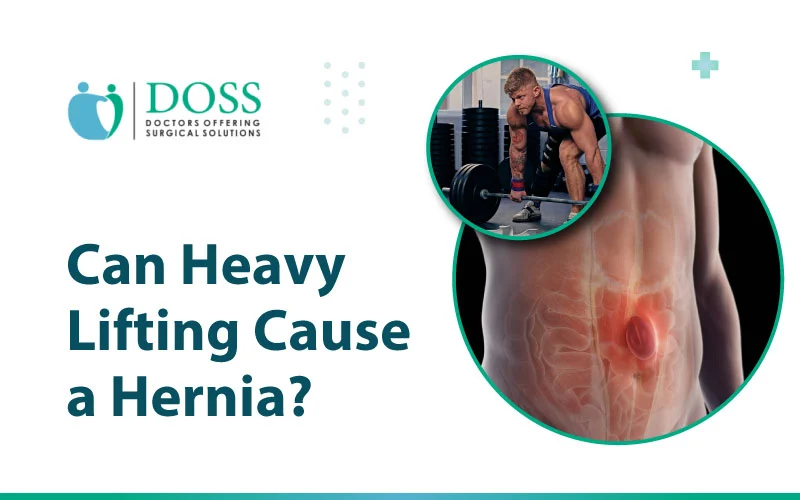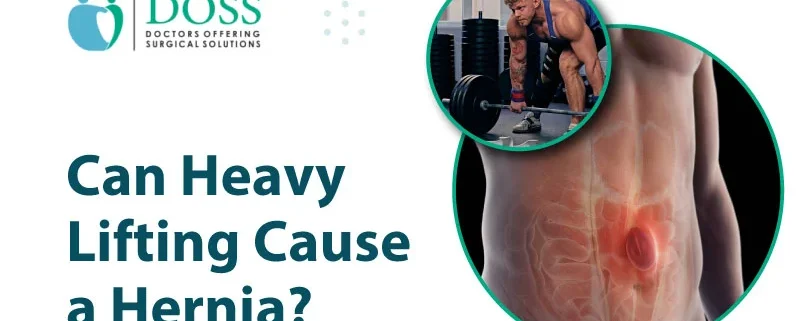Can Heavy Lifting Cause Hernia ?
Blog
With the increasing popularity of weightlifting for better health, many individuals wonder if heavy lifting can cause a specific medical condition. This article delves into that question.
Let’s begin by exploring the nature of a hernia and the various factors that can lead to its development. Then, we’ll explore whether heavy weightlifting plays a role in hernia risks. Throughout the process, we’ll provide helpful advice for lifting safely and avoiding problems. Let’s investigate whether weightlifting can have consequences beyond just muscle growth.
What is hernia?
When an internal part of the body pushes through a weakness in the muscle or surrounding tissue wall, a hernia occurs. Usually, it appears as a visible protrusion that may become more noticeable when under strain or lifting heavy items. Here are the most common types of hernias:
- Inguinal Hernias: Found in the groyne area, this type is most common, particularly in men. It occurs when fatty tissue or a portion of the bowel protrudes into the groyne at the upper inner thigh.
- Femoral hernias are comparable to inguinal hernias, as they develop when fatty tissue or a part of the bowel bulges into the region near the femoral artery in the upper thigh. They are not as prevalent and typically impact more women than men.
- Umbilical hernias typically develop around the belly button and are frequently seen in infants. However, they can also impact adults who are overweight or have had multiple pregnancies.
- Hiatal hernias occur when a section of the stomach pushes up into the chest through an opening in the diaphragm, which can lead to gastroesophageal reflux.
- Incisional hernias may develop after abdominal surgery, with the intestine protruding through the incision scar or nearby weakened tissue.
They are frequently seen in individuals who are overweight or have undergone numerous abdominal surgeries.
Link Between Heavy Weightlifting and the Risk of Developing a Hernia
Discussing the connection between heavy weightlifting and hernia formation can be intriguing, but definitive answers are still hard to come by.
However, research has shown that regularly participating in heavy weightlifting can increase pressure on the abdominal muscles and nearby tissue. This strain, when combined with pre-existing weaknesses, could potentially lead to the development of a specific condition.
It’s crucial to understand that heavy lifting may not directly cause hernias. Still, it can trigger them in individuals with certain pre-dispositions like a weakened abdominal wall, previous hernias, or a surgical site that hasn’t fully healed.
Medical advice frequently stresses the importance of using the correct form and appropriate equipment to reduce the chance of injury. Furthermore, personal health factors, like maintaining a healthy weight and gradually increasing lifting intensity, are essential in avoiding injuries while weightlifting.
Various other factors may play a role in the development of a hernia
Various factors beyond intense weightlifting contribute to the formation of hernias, each playing a distinct role in the weakening of the abdominal structure.
Age plays a crucial role in the weakening of muscles, especially those in the abdominal wall, which can lead to an increased risk of hernias.
Moreover, genetics may make individuals more susceptible to muscle weakness or defects in the abdominal wall, increasing their likelihood of developing a hernia.
Factors like smoking can also play a role by causing a chronic cough that puts pressure on the abdominal muscles, making any weakness worse.
Additionally, multiple pregnancies or having chronic obstructive pulmonary disease (COPD) can put a strain on the abdominal region, increasing the risk of developing a hernia.
Weakened abdominal muscles play a crucial role in the development of hernias. When these muscles weaken, it creates an opportunity for various factors, whether they are inherent, like a congenital disability or external, like strenuous physical activity, to result in a hernia. Having a solid and resilient abdominal wall is crucial for avoiding hernias.
Also Read- The Role of Diet in Hernia Management
Understanding Your Body: Recognising Your Limits
Weightlifters must be mindful of their body’s limits to prevent injuries.
Being alert to any signs or symptoms that may indicate a potential problem is crucial. If you notice a bulge, discomfort, or heaviness in your abdomen, it’s essential to stop your activities and seek advice from a medical professional right away.
Similarly, experiencing sharp or sudden pain, particularly when lifting, coughing, or engaging in strenuous activities, is a sign that should not be overlooked.
Other indicators involve any noticeable alteration in the ease or comfort of executing everyday motions that were previously painless.
Weightlifters can maintain their health by paying attention to their body’s signals and messages while working towards their strength-training objectives.
Seeking advice from medical experts
Before starting any rigorous exercise routine, it’s crucial to seek advice from a medical expert. It’s essential for people with specific health issues or a history of hernias.
Having a thorough medical evaluation can pinpoint any potential problems that may worsen with intense physical activity.
Furthermore, medical professionals can provide personalised recommendations that match an individual’s specific physiological requirements, guaranteeing a secure and efficient exercise regimen.
By seeking expert advice, individuals can protect their well-being while enhancing their fitness journey.
Also Read – Hernia Complications
Adopting a Well-Rounded Fitness Strategy
Ultimately, weightlifters should strive for a well-rounded fitness regimen despite the advantages of strength training.
Emphasising the importance of listening to the body’s signals, consulting with experts before starting intense workouts, and customising fitness routines based on individual health needs can result in better and more fulfilling results.
By being mindful and prepared, people can experience the benefits of lifting weights, transform their bodies positively, and reduce the chances of getting hurt for their overall health.


 +919011100010
+919011100010 


